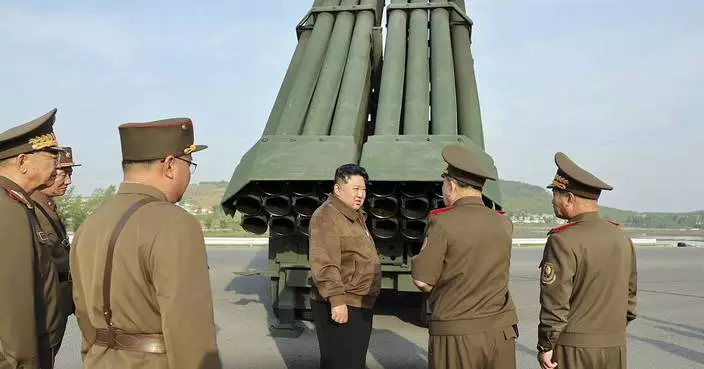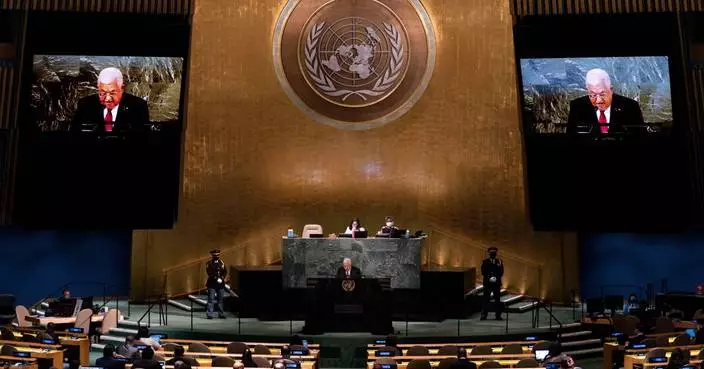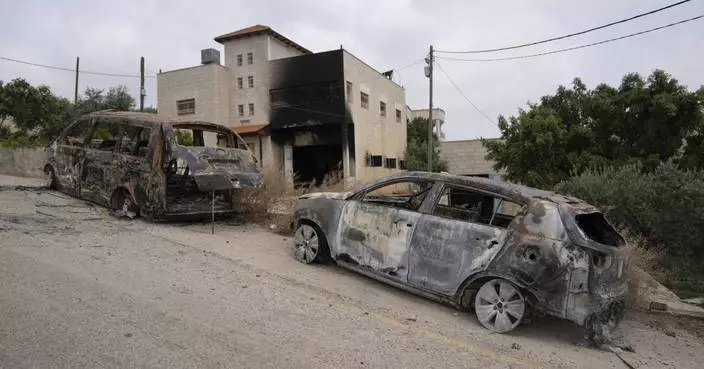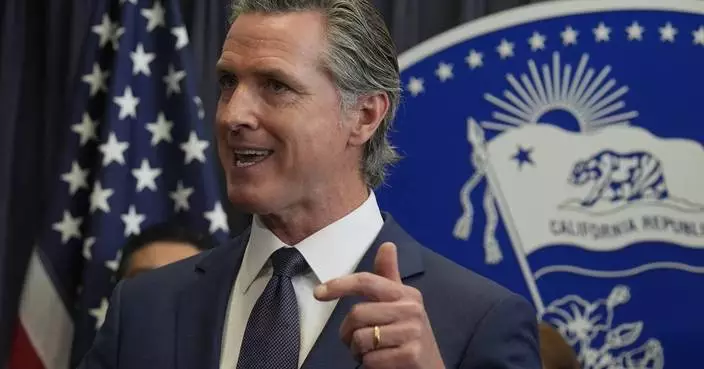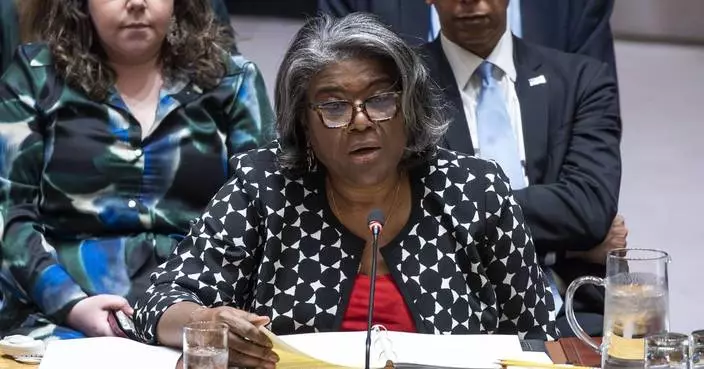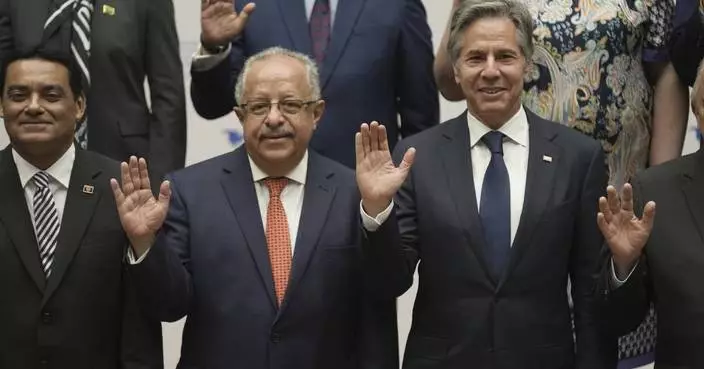Iran's U.N. ambassador warned Monday that the situation in the Persian Gulf is "very dangerous" and called talks with the U.S. impossible in the face of escalating sanctions and intimidation, while the U.S. envoy said the Trump administration's aim is to get Tehran back to negotiations.
Recent attacks on tankers and the downing of a U.S. drone played out in comments before and after a closed U.N. Security Council meeting called by the United States that provided saw sharply different views of the current situation. It took place hours after U.S. President Donald Trump signed an executive order targeting Supreme Leader Ali Khamenei and senior Iranian military figures with financial sanctions.
Iranian Ambassador Majid Takht Ravanchi called the new sanctions another indication of "U.S. hostility" toward the Iranian people. He said the Trump administration should de-escalate tensions by stopping "its military adventurism" in the region, withdrawing its "naval armada" and moving away from "economic warfare against the Iranian people."
Acting U.S. Ambassador Jonathan Cohen outlined the U.S. case for blaming Iran for tanker attacks May 12 and June 13 and for shooting down a $100 million U.S. drone in international airspace June 20. Iran denies it attacked the tankers and says the drone was in its airspace.
"Iran must understand that these attacks are unacceptable," Cohen said. "It's time for the world to join us in saying so."
Cohen reiterated that U.S. policy "remains an economic and diplomatic effort to bring Iran back to the negotiating table." He repeated his call to meet diplomacy with diplomacy, noting that Iran dismissed it two weeks ago as "inflammatory."
Ravanchi said he agrees with U.N. Secretary-General Antonio Guterres' call to de-escalate tensions in the Gulf region, but said that is up to the United States, not Iran.
He ruled out any talks with the Trump administration. "You cannot start a dialogue with someone who is threatening, who is intimidating you," he said, accusing the U.S. of trying to destroy Iran's economy.
Ravanchi urged the U.N. chief to initiate "a genuine regional dialogue on regional security ... so that we will see a new region for the generations to come."
The Security Council issued a statement condemning the latest attacks on oil tankers and urging all parties "to exercise maximum restraint and take measures and actions to reduce escalation and tension." The statement made no mention of the drone attack.
France, Germany and the United Kingdom issued a separate statement warning that increased tensions in the Gulf since the drone attack "risk miscalculation and conflict." The three countries called for "de-escalation and dialogue" and reiterated their support for the 2015 Iran nuclear deal that President Donald Trump pulled out of last year.
Responding to the U.S. administration's "maximum pressure" campaign against Iran, French Ambassador Francois Delattre told reporters: "The message of France is we're in a time where maximum pressure only makes sense with maximum diplomacy. So that's where we must go."
Russia's U.N. ambassador, Vassily Nebenzia, also referred to the U.S. desire for dialogue with Iran.
"Some of the Iranian officials recently said that you cannot have a dialogue with a knife against your throat," Nebenzia said. "What kind of dialogue if you are introducing the worst kind of sanctions ever?"
UNITED NATIONS (AP) — The United States called on Iran on Monday to halt its transfer of an “unprecedented” amount of weaponry to Yemen’s Houthi rebels, enabling their fighters to carry out “reckless attacks” on ships in the Red Sea and elsewhere.
U.S. deputy ambassador Robert Wood told the U.N. Security Council that if it wants to make progress toward ending the civil war in Yemen, it should collectively “call Iran out for its destabilizing role and insist that it cannot hide behind the Houthis.”
He said there is extensive evidence that Iran is providing advanced weapons, including ballistic and cruise missiles, to the Houthis in violation of U.N. sanctions.
“To underscore the council’s concern regarding the ongoing violations of the arms embargo, we must do more to strengthen enforcement and deter sanctions violators,” Wood said.
The Houthis say their attacks on shipping in the Red Sea and Gulf of Aden are aimed at pressuring Israel to end its war with Hamas in Gaza, which has killed more than 35,000 Palestinians there. The war began after Hamas-led militants attacked Israel on Oct. 7, killing 1,200 people and taking some 250 others hostage.
The Houthis have launched more than 50 attacks on shipping, seized one vessel and sunk another since November, the U.S. Maritime Administration said late last month.
Houthi attacks have dropped in recent weeks as the rebels have been targeted by a U.S.-led airstrike campaign in Yemen. Shipping through the Red Sea and Gulf of Aden has declined because of the threat.
Hans Grundberg, the U.N. special envoy for Yemen, warned the council that “hostilities continue,” even though there has been a reduction in attacks on commercial and military vessels in the Red Sea, Gulf of Aden and the Indian Ocean, as well as a reduction in the number of U.S. and British airstrikes on targets in Yemen.
He pointed to an announcement by the Houthis that they will “expand the scope of attacks," calling this "a worrisome provocation in an already volatile situation.”
Russian Ambassador Vassily Nebenzia told the council that the Israeli announcement on May 6 that it was starting its military operation in Gaza’s southern city of Rafah, where 1.2 million Palestinians had sought safety, ratcheted up the spiral of escalation in the region “another notch further.”
“There’s no doubt that this will have an impact on the situation in Yemen’s surrounding waters,” he said, noting the Houthis’ opposition to Israeli attacks that harm Palestinian civilians.
“We call for a swift cessation of the shelling of commercial vessels and any other actions that hamper maritime navigation," Nebenzia added.
He sharply criticized the United States and its Western allies, saying their “totally unjustified aggressive strikes” in Yemen violate the U.N. Charter. He said they further complicate an already complex situation in the Red Sea.
The war between the Houthis and pro-government forces in Yemen backed by a coalition of Gulf Arab states has raged since 2014. The Houthis swept down from the mountains, seized much of northern Yemen and the country’s capital, Sanaa, and forced the internationally recognized government to flee into exile to Saudi Arabia. Since then, more than 150,000 people have been killed by the violence and 3 million have been displaced.
Fighting has decreased markedly in Yemen since a truce in April 2022, but there are still hotspots across the country.
Grundberg recalled that in December, the Houthis and the government “took a courageous step towards a peaceful solution” by agreeing to a series of commitments that would provide for a nationwide cease-fire, ensure desperately needed humanitarian aid, and initiate a political process to end the conflict.
However, U.N. humanitarian chief Martin Griffiths reported “alarmingly high” levels of severe food deprivation across the country that are expected to worsen during the lean season for crops, starting in June.
Griffiths also expressed serious concern about a rapidly worsening cholera outbreak. He cited reports of 40,000 suspected cholera cases and over 160 deaths — “a sharp increase” since last month, the majority in Houthi-controlled areas “where hundreds of new cases are reported every day.”

A Houthi soldier stands alert in front of the Israeli Galaxy ship which was seized by the Houthis, in the port of Saleef, near Hodeidah, Yemen, Sunday, May 12, 2024. (AP Photo/Osamah Abdulrahman)

A Houthi soldier stands on board of the Israeli Galaxy ship which was seized by the Houthis, in the port of Saleef, near Hodeidah, Yemen, Sunday, May. 12, 2024. (AP Photo/Osamah Abdulrahman)





